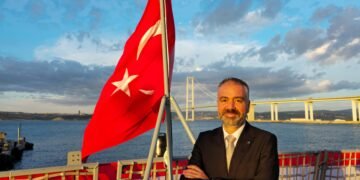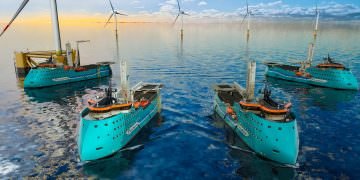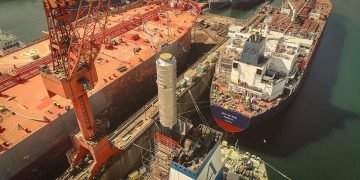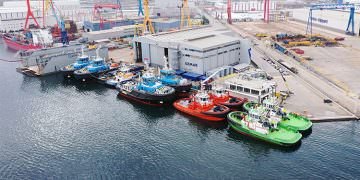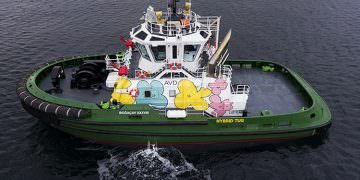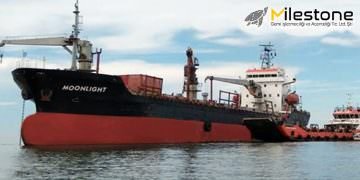Mercan Shipping accelerated the integration of Ballast Water Treatment System (BWTS) into its vessels within the framework of IMO rules preferred the Brightsky brand BWT system. The company signed an agreement for Aleyna Mercan vessel for the first time with Yaf Diesel, which is the brand’s distributor in Turkey.
Mercan Shipping, which is one of the Turkish companies engaged in chemical tanker transportation, started to integrate Ballast Water Treatment System (BWTS) into five different vessels in its fleet. The company, which plans to integrate the system first to its Aleyna Mercan vessel, has signed an agreement with brand Yaf Diesel that is the brand’s distributor in Turkey for the use of Brightsky brand BWTS recently. Mercan Shipping Technical Manager Abdulvahap Yilmaz evaluated the factors for choosing Birghtsky among many systems to Neta Sea.
Could you tell us briefly why you prefer Birghtsky Ballast Water Treatment System as Mercan Shipping?
We have thoroughly studied seven systems, including Brightsky before deciding on this system. we especially examined the exproof systems due to the fact that our vessels are chemical tankers. We focused on ultraviolet (UV) more compact, more useful systems, due to the small tonnage of chemical tankers and limited volumetric areas onboard. In other words, some systems have balances within the equipment itself. For example; the filter will be no more than 3 meters away from UV or there will be no difference in level between them so as to be certain standards between the input circuit and the output circuit. But this system allowed us to use the equipment side by side and on top of each other. It was a direction that attracted us. One of the most important factors that pushed us to choose this system was the lack of filters in the system. The rule is that the system on your vessel should reduce the rate of microorganisms in 1 cubic meter of water to less than 7. Particles below 40 microns must pass through the filter for the UV lamps to be effective for this process. Particles over 40 microns cannot be removed by UV lamps. For this procedure, you have to use a filter system. These filters also have clogging and performance degradation over time. These blockages have effects that increase your operational processes, port periods and financial burdens. Therefore, I can say that the lack of filters in the Brightsky system has attracted us the most.
Other reasons for preference are that when you examine the system as opex maintenance costs are also very low, the number of spare parts supplied when purchasing the system is higher than other brands, they assume to keep these spare parts in stock in procurement of such spare parts, and of course it is very advantageous compared to other systems as the price advantage.
In addition, my contact with Yaf Diesel company dates back to 7-8 years. We have worked together. We have mutual trust. We are well aware of the knowledge, experience that Yaf Deiesel has acquired the Far East. Since Bighysky BWT system is an origin of Far East system, we believe that they will always support it.

You mentioned that it is more advantageous in terms of cost, what can you say if we make a comparison?
The systems we examined were mostly from Northern Europe. Because, they conducted very serious research and investments in this matter. A ballast pump on our vessel has a total capacity of 360 cubic meters, including 180 cubic meters of 2 pumps. In researches we conduct on such capacities, we have observed that Brightsky, which Yaf Diesel assumes its representation, provides an advantage of approximately 40 percent. Besides, of course, when you plan the spare parts costs for the next 5-10 years, we stipulate that it will provide an advantage of close to 60 percent in terms of average maintenance costs. These are all our predictions. As we use the system, there may be some deviations in these proportions, and we will see it.
Do you plan to use the system on all your vessels? Can you tell us about your current agreement terms?
Our deal with Yaf Diesel for a vessel in the first phase. But after seeing and evaluating the system in the following process, we are considering the application for the other 4 vessels. When coming to the agreement we signed, of course, we have signed an agreement in which the rules of international trade law, some local trade rules in our country and our past experience are also effective. Of course, the agreement for us here is only in the nature of protocol. What matters to us here is mutual trust and support to one of us.
Did you research and exchange information about companies using the system?
As far as I know, we are the second or third company to use the system in Turkey. We learned through Yaf Diesel the information of a company, of which installation has been completed and started to be used. We have received information that they do not have any problems. Birghtsky also receives information from users worldwide and this information was shared through Yaf Diesel. We also considered the references incoming there. Information incoming there is that system is operating smoothly. The system’s references include a wide range of shipowners, from Japanese to Europeans. There are those who are currently using and have agreed to use them. We considered thereof.
When do you plan to install the equipment onboard?
Currently, the production phase of the equipment continues. We continue to exchange information. Our plan is in direction that the equipment will be ready as January-February.We are considering starting the assembly project after in the middle of 2020 March, taking vessel into the shipyard together with delivering it into Turkey.




